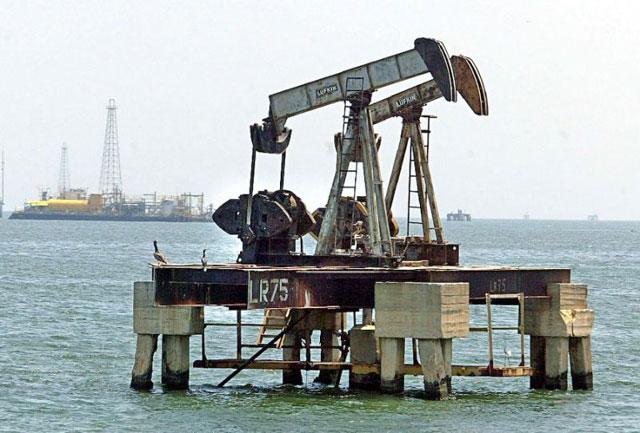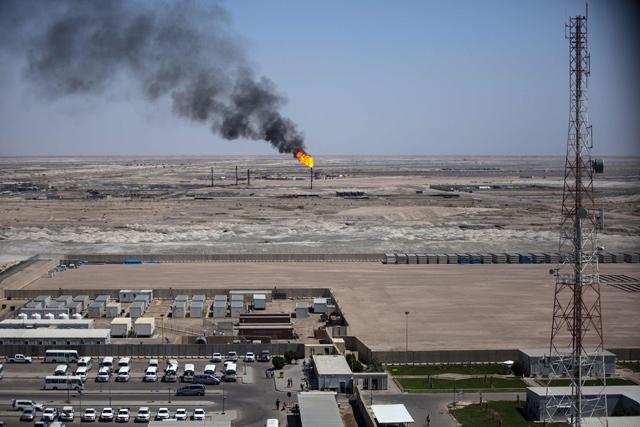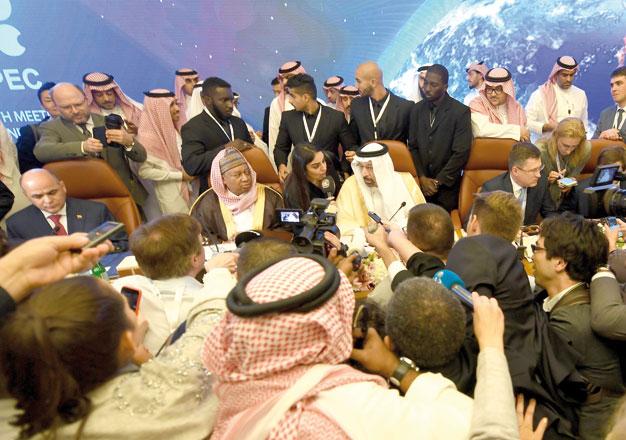You are here
Oil producers to decide in June on extending cuts
By AFP - Mar 18,2019 - Last updated at Mar 18,2019

Azerbaijan’s Energy Minister Parviz Shahbazov (right) and Saudi Arabia’s Energy Minister Khalid Al Falih attend a press conference at the end of the 13th meeting of the Joint Ministerial Monitoring Committee of OPEC and non- OPEC countries in Baku on Monday (AFP photo)
BAKU — Major oil producers led by Saudi Arabia agreed on Monday to keep working together to prop up crude prices, but said they would decide only in June on whether to extend production cuts.
Meeting in Azerbaijan’s capital Baku, members of the OPEC+ alliance said they would continue coordinating efforts to “stabilise” the oil market through production cutbacks.
But they postponed a planned April meeting and said a decision would be made in June on whether to extend production cuts into the second half of 2019, once the impact of US sanctions on Iran and Venezuela is more clear.
In a joint statement after the talks, members of the alliance stressed the need to “restore market stability and prevent the recurrence of any market imbalance” — shorthand for keeping prices from dropping too low.
The 24-nation alliance came together in 2016, when the Saudi-dominated Organisation of Petroleum Exporting Countries (OPEC) and Russia agreed on the need to limit production in the face of tumbling prices.
The OPEC+ alliance has endured, with regular meetings and agreements to extend production limits, helping oil prices rise from around $40 per barrel in 2016 to an average of $70 per barrel last year.
The meeting in Baku brought together the group’s monitoring committee to review the latest extension, which saw OPEC+ nations agree to cut production by 1.2 million barrels per day from January to June.
The committee was due to meet again next month, but on Monday that meeting was postponed until May.
The joint statement also said that the decision “on the production target for the second half of 2019” would be taken at an OPEC Conference meeting on June 25.
New OPEC+ committee members
The move to wait until June took place amid confusion over the impact of US sanctions on OPEC members Iran and Venezuela, with Russia saying more time was needed due to high volatility.
Addressing Monday’s meeting, Saudi energy minister Khalid Al Falih urged OPEC+ members to maintain the alliance.
“It is more important than ever that we continue to collaborate,” he said.
OPEC, and mainly Saudi Arabia, have made it clear they would like to formalise longer-term cooperation with Russia, though Moscow has been hesitant.
Falih raised the issue again in Baku, saying that “institutionalising a framework for longer-term cooperation” was very important.
The alliance said after the talks that Iraq, Kazakhstan, Nigeria and the United Arab Emirates had also become new members of the committee.
The pact has breathed fresh life into OPEC and brought Russia new influence as an arbiter on the oil market.
Creating the alliance was not an easy decision after years of fierce competition for market share that lead to overproduction.
Uncertainty over US sanctions
Russian energy minister Alexander Novak said it was hard to plan for months ahead because of the volatility due to the sanctions against Iran and Venezuela.
“We have to take these uncertainties into account in making decisions on the market,” he was quoted as saying ahead of Monday’s meeting.
US President Donald Trump pulled Washington out of a nuclear accord with Iran in May last year and reimposed sanctions on Tehran.
From late April, US companies and citizens will be barred from dealing in Venezuelan crude, as Washington ramps up punishment against President Nicolas Maduro’s government.
But Trump has also urged OPEC to take steps to lower prices, saying in a tweet last month: “Oil prices getting too high. OPEC, please relax and take it easy.”
The Saudi energy minister was defiant in response, saying at the time that OPEC was pursuing a measured response and that he was leaning towards extending production cuts in the second half of 2019.
Host Azerbaijan is one of the alliance’s non-OPEC members and analysts said the ex-Soviet republic has used its participation to court investment in its oil sector.
After years of growth, Azerbaijan’s oil and gas production is stabilising.
Analysts at S&P Global Platts said the country is forging closer ties with Riyadh and in recent weeks hosted several Saudi delegations.
Azerbaijan “needs to attract new investment if it is to successfully replace current reserves and maintain production volumes over the next few decades,” they said.
Related Articles
DUBAI/LONDON/MOSCOW — The Organisation of the Petroleum Exporting Countries (OPEC) cartel may raise oil output from July if Venezuelan and I
DUBAI — Top oil producers will consider fresh output cuts at a meeting this week, but analysts are doubtful they will succeed in bolstering
JEDDAH, Saudi Arabia — Oil supplies were sufficient and stockpiles were still rising despite massive output drops from Iran and Venezuela, s














